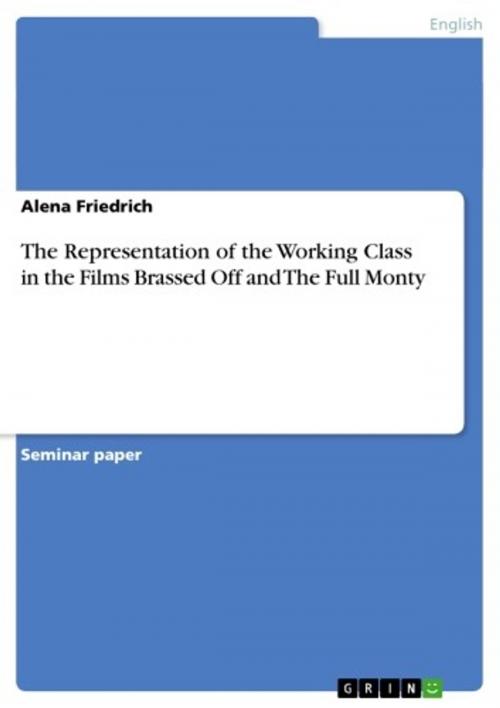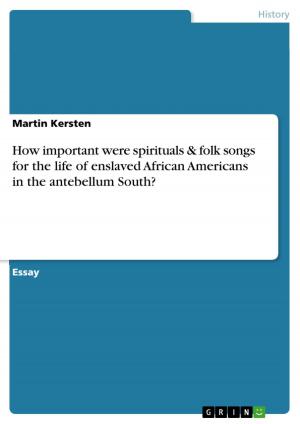The Representation of the Working Class in the Films Brassed Off and The Full Monty
Nonfiction, Reference & Language, Study Aids, ESL, Foreign Languages| Author: | Alena Friedrich | ISBN: | 9783638198738 |
| Publisher: | GRIN Publishing | Publication: | June 18, 2003 |
| Imprint: | GRIN Publishing | Language: | English |
| Author: | Alena Friedrich |
| ISBN: | 9783638198738 |
| Publisher: | GRIN Publishing |
| Publication: | June 18, 2003 |
| Imprint: | GRIN Publishing |
| Language: | English |
Seminar paper from the year 2003 in the subject English Language and Literature Studies - Culture and Applied Geography, grade: 1,7 (A-), University of Leipzig (Anglistics), course: Screening Britain: British History and Society in Recent Films, 16 entries in the bibliography, language: English, abstract: Ziel dieser Arbeit ist es, die Darstellung der britischen Arbeiterklasse in den beiden Filmen 'Brassed Off' (Mark Herman, 1996) und 'The Full Monty' (Peter Cattaneo, 1997) zu analysieren. Insbesondere soll dabei auf die sozio-ökonomische Situation der Charaktere, deren soziale Beziehungen untereinander, den 'Working Class Pride and Traditionalism', die männliche Identifikation der Figuren und ihre regionale Verwurzelung eingegangen werden. Die zentralen Fragen, die sich dahingehend stellen, sind: Wie werden diese Aspekte in den Filmen dargestellt? Und inwiefern werden sie stereotypisiert dargestellt? Diese Arbeit beruht auf der Annahme, dass die meisten Stereotype auf das traditionelle Bild der 'working class' des beginnenden 20. Jahrhunderts zurückgreifen. Aus diesem Grund wird diese Ära und ihr Einfluss auf das Leben der Arbeiter näher betrachtet, um dann Rückschlüsse auf die Repräsentation der Arbeiterklasse in 'Brassed Off' und 'The Full Monty' ziehen zu können. This essay, which is going to analyse the representation of class in 'Brassed Off' and 'The Full Monty', will particularly focus on the typicality of the representations. It will analyse the characters' socio-economic situation, their social bonds, the 'working class pride and traditionalism', the workers' male identity and their regional identity. The central question will be, in which ways the films can be seen as 'typical' working class motion pictures. In this respect, the stereotyping of the social classes in these two films will particularly be focused on. This essay is based on the assumption that most stereotypes refer back to the traditional image of the working class as it existed at the beginning of the 20th century. In this context, it shall be analysed if the makers of 'Brassed Off' and 'The Full Monty' also used such stereotypes to produce an image of 'the good old working class'. In order to gain an understanding of these working class stereotypes, the first chapter of this paper will deal with the 'old' working class as it existed at the turn of the 20th century and its main characteristics.
Seminar paper from the year 2003 in the subject English Language and Literature Studies - Culture and Applied Geography, grade: 1,7 (A-), University of Leipzig (Anglistics), course: Screening Britain: British History and Society in Recent Films, 16 entries in the bibliography, language: English, abstract: Ziel dieser Arbeit ist es, die Darstellung der britischen Arbeiterklasse in den beiden Filmen 'Brassed Off' (Mark Herman, 1996) und 'The Full Monty' (Peter Cattaneo, 1997) zu analysieren. Insbesondere soll dabei auf die sozio-ökonomische Situation der Charaktere, deren soziale Beziehungen untereinander, den 'Working Class Pride and Traditionalism', die männliche Identifikation der Figuren und ihre regionale Verwurzelung eingegangen werden. Die zentralen Fragen, die sich dahingehend stellen, sind: Wie werden diese Aspekte in den Filmen dargestellt? Und inwiefern werden sie stereotypisiert dargestellt? Diese Arbeit beruht auf der Annahme, dass die meisten Stereotype auf das traditionelle Bild der 'working class' des beginnenden 20. Jahrhunderts zurückgreifen. Aus diesem Grund wird diese Ära und ihr Einfluss auf das Leben der Arbeiter näher betrachtet, um dann Rückschlüsse auf die Repräsentation der Arbeiterklasse in 'Brassed Off' und 'The Full Monty' ziehen zu können. This essay, which is going to analyse the representation of class in 'Brassed Off' and 'The Full Monty', will particularly focus on the typicality of the representations. It will analyse the characters' socio-economic situation, their social bonds, the 'working class pride and traditionalism', the workers' male identity and their regional identity. The central question will be, in which ways the films can be seen as 'typical' working class motion pictures. In this respect, the stereotyping of the social classes in these two films will particularly be focused on. This essay is based on the assumption that most stereotypes refer back to the traditional image of the working class as it existed at the beginning of the 20th century. In this context, it shall be analysed if the makers of 'Brassed Off' and 'The Full Monty' also used such stereotypes to produce an image of 'the good old working class'. In order to gain an understanding of these working class stereotypes, the first chapter of this paper will deal with the 'old' working class as it existed at the turn of the 20th century and its main characteristics.















